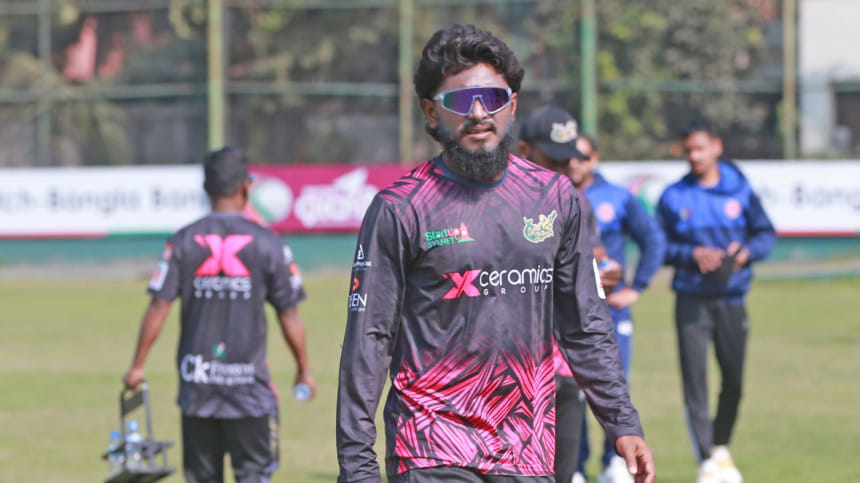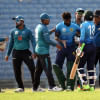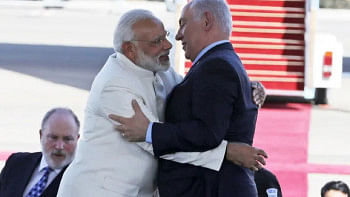I know exactly how to play my game: Jaker Ali

Bangladesh batter Jaker Ali Anik, fresh from a month-long West Indies tour, has had a breakthrough year, integrating into the national team across all formats. Despite a lacklustre T20 World Cup performance, the 26-year-old shone in the Caribbean, scoring consistently across formats. Jaker was still jet-lagged, after returning to country from the West Indies, while he spoke to The Daily Star's Abdullah Al Mehdi during an exclusive interview, as he reflected on his latest assignment, team's mindset, and his evolving game, among other things. Read the full interview below:
The Daily Star (DS): According to you, how was the series from the team's perspective?
Jaker Ali (JA): It went very well. When we were in the West Indies, talking during the team dinner, we acknowledged that everyone played good cricket. After not playing well in the first Test, we made a comeback in the second. In the ODIs, we played well in most of the games, but maybe the bowling unit did not perform as they are used to. It can happen since the bowling unit always wins us matches, and one series can go a little badly, but they proved themselves again [in T20Is]. It was an outstanding series for us as a team.
DS: What changed in the second Test after a hammering in the first?
JA: In the first Test, we discussed the mistakes, but the most important thing was that we went to the second Test not to earn a draw but to win the game. The biggest indicator was we won the toss and batted first. The majority of the time, we want to bowl first as a team, but the whole credit goes to the coach and captain. They showed that bravery because it was quite challenging.
The coach [Phil Simmons] said that we came here to win, so we must do everything needed in order to win. Phil read the wickets really well and recognised that deliveries would take a turn later, which is exactly what happened.
DS: What changed in the mindset since Bangladesh do not usually bat first?
JA: We played the entire series as a team. Our biggest target was that whatever happened, we would stay together. If we win, we will win together, and if we lose, we will do that together too. Everyone was very positive. Even after losing the first game, everyone was talking about winning, and body language never dropped.
Even West Indies players were surprised about our body language. They thought we would play quietly, but they could not fathom the way we would get charged up and go after them.
DS: There was plenty of sledging?
JA: Yeah, lots of things happened, and obviously, not everyone could see what happened. But in the second Test, there were a lot of fracas between the two teams, and we felt that since they were giving it to us, we wouldn't give any quarters. So everyone stayed together. This is how it should be. Whatever happens, to help the country win, to say something or help pick up a crucial wicket or a good piece of fielding, those are the achievements.
DS: With key batters missing, did Windies' aggression help get you fired up?
JA: We had prepared for these kinds of things. We knew our previous stats [in the West Indies] were not good. We knew that they would sledge, bowl bouncers, and we had taken mental preparations.
Yes, we didn't have key batters, but trust me, inside the team, there was never that feeling that there were gaps. All of us were like, 'I got an opportunity, and I would play 20-30 deliveries more for the team'.
DS: What was your particular plan against their short balls or other plans in the shorter formats?
JA: When I played for the A team in the West Indies [in 2022], I struggled with bouncers. After returning, I worked on bouncers and my pulls and hooks. Maybe they felt I would be the same player. Back then, I took a lot of bouncers in the body, but this time I had prepared. I had controlled the pull. I also had to charge them since we didn't have many wickets left [in the second Test], and adding quick runs was important.
DS: Do you now feel more accomplished with your power-hitting game?
JA: The last T20 innings is special because bowlers do not bowl in my comfort zone. After the first one-day match, Windies bowlers realised that it's free for the taking when they bowl at my stumps during the slog overs.
You could see how wide they were bowling. Scoring runs against the tide was something special. I saw their plans and changed my stance. They were trying to bowl wide yorkers or slower deliveries, and I shuffled to get closer.
DS: What are your feelings about the series win?
JA: The coach [Simmons] told us not to give any quarters and told us before the third game that we would only realise what we have done when we get back home. Now I am realising it since returning. We weren't thinking that we had won the series and there was no point to the third game. Our best performance came in the last T20I, and we gave them the hammer blow in the last game, which gives an idea of the preparation and mindset we went with.
DS: Senior assistant coach Salahuddin talked about needing more consistency. What did he say about changing the mindset?
JA: He gave clear concepts like always. The biggest thing is he allowed us to play our natural game. He told us to play with freedom. I will talk about a small incident. In the second ODI, we made only 227. In the meeting, he said, 'Look, if we score 220 in such wickets, we will lose. If we don't show intent, we will lose anyway. So if we show intent and score only 150 and lose, it's not a problem. But we must play for 300-plus.' In the third game, you saw the changes [as the Tigers scored 321]. Sir always gave clear messages which are helpful.
DS: You debuted in ODIs and also played in a T20 World Cup. What were your learnings?
JA: This T20 World Cup was a very good lesson for me. In the T20 World Cup, I didn't perform up to my own expectations. After the World Cup, I started my preparations when I learned I might be part of the West Indies tour. I planned that the problems I faced, I wouldn't face the same ones again.
The West Indies is very windy, and the wickets too are different. I worked on the little things. In the West Indies, at times you just can't hit towards one particular side of the ground. Even their players struggled, even though they are very powerful. In the last T20I, I hit two sixes against the wind. In T20 cricket, it's difficult if bowlers know which side a batter is targeting. The two sixes through cover were against the wind.
A mistake I learned from in the World Cup and didn't make this time around is that you have to take the wind factor into account in the West Indies if you want to score.
DS: You are often criticised for being limited with your off-side shots. What do you make of it?
JA: Yes. It's not important that I have to play through the off-side. What's important is I score runs. I never felt like that; instead, I play to my strength, and that's what I will continue to do. My strength is to get close to the deliveries. The bat swing makes it such that often I play through the on-side, but I always aim to play straight. I know exactly how to play my game, and it's not like I have to play only through the off-side or only the leg-side. In that microsecond of time, I have to find a way to hit it depending on where it's delivered, and that's what I try.
It's all practice and mindset. I have to read what the bowler is doing in T20 cricket. If I can do that early, the task is easier.
DS: Are you seeing a similar level of interest from teammates in those decisions and improvements?
JA: Yes, obviously. The bowlers know what they want to do. Batters are at least getting to understand the situations better. I think these things will take us forward.
DS: Your thoughts on ODIs going forward, especially with the Champions Trophy coming up?
JA: We have been instructed to play well in the BPL. Obviously, those selected for the Champions Trophy will have to stay in touch. Given the mental strength the team has right now, I feel we will do something good in the Champions Trophy. Something big. We have good chances.
The players under the radar are all doing well in the middle order. The plan is to do well in the BPL.
DS: How do you see this year's gains in making Test and ODI debuts along with playing in a World Cup?
JA: Actually, I don't think about these things. Whatever took place has ended, whether good or bad. I am a forward-looking person. Obviously, I am grateful for the good things, but I won't be dawdling on them. I think I have to look forward to doing things better. I'm working on fitness currently.
DS: It's said that you used to practise commentary in your childhood so you could talk when taking player-of-the-match awards?
JA: Yes, I used to practise that. Like how I am going to be when I win the man-of-the-match award. I was a big fan of Bangladesh cricket growing up, and these things happening for real give me joy.
DS: Your childhood hero Mushfiqur Rahim praised you highly. How was it for you?
JA: Yes, obviously. He even texted me after the T20s. He was very happy, and everyone else was happy, which was very encouraging when it comes from the elder brothers.

 For all latest news, follow The Daily Star's Google News channel.
For all latest news, follow The Daily Star's Google News channel. 








Comments